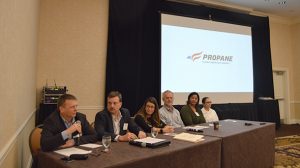PERC hosts Trainer’s Conference in San Antonio

A panel at PERC’s 2018 Trainer’s Conference covered training challenges, CSR training and compliance issues. Photos by Allison Barwacz
The Propane Education & Research Council (PERC) hosted its 2018 National Trainer’s Conference Jan. 16-17 in San Antonio.
The event focused on the best strategies for training employees at propane operations, as well as how to maintain the highest level of safety.
“Whether you’re a big marketer or a small marketer, the challenge is still the same,” says Stuart Flatow, vice president of safety and training at PERC. “It’s very important that we continue to lower the barrier for propane marketers to train their employees and talk to their customers about safety.”
More than 80 people attended the event, which covered state association training challenges, safety and liability issues, and new training technologies and techniques.
Tony Dale, Texas state representative, opened the conference with a keynote speech. Dale, who previously served in a number of positions at Ferrellgas, offered tips for maintaining safety and educating communities. He also provided advice for connecting with local legislators.
Some legislators are your enemies and some are your allies, Dale says. Find out which ones are your allies and educate them so they can help the industry.
A rundown on training methods
One of the breakout sessions, presented by Jan Bray, founder and chief strategist at Bray Strategies, and Wanda Monthey, executive director at Monthey Associates and previous administrator at the Maine Department of Education, covered different types of learning, including traditional, online, independent and blended.
A newer term, blended learning refers to a blending of traditional face-to-face classroom facilitation with computer-based modules.
“If you want new workers, you’re going to have to rethink how you train and how you assess,” Bray says. “This industry needs to think differently – what it communicates, how it reaches out to identify and pursue potential workers, and how it does its training.”
Monthey and Bray also emphasized the importance of using more than just a multiple-choice-test format for potential employees and trainees. They highlighted the use of task-based training, a technique adopted by PERC to make sure trainees know how to physically perform a task.
“The assessment needs to be more than a multiple-choice question,” Monthey says. “It needs to show that the person can actually perform the task.”
The session emphasized the importance of connecting with PERC to develop a communications plan for hiring employees, as well as a roadmap for developing new training materials.
CSR training
Another breakout session highlighted the importance of customer service representative (CSR) training.
The session, led by McCoy, Leavitt & Laskey partner John Hansen, showcased why it’s critical that CSRs receive training, citing a number of fatal incidents that happened as a result of a miscommunication between clients and CSRs or a lack of CSR training.
“We spend hours and dollars and time training our bobtail drivers,” Hansen says. “We spent hours and dollars and time talking to our service technicians. Yet the first person who answers a call doesn’t always have training.”
In order to more thoroughly train CSRs, Hansen offered a number of tips, including training them, making sure they understand their safety roles, making them a part of your safety teams, providing scripts, encouraging them to ask questions and letting them know they’re not alone.
“They are the first line of defense,” Hansen adds.
New training technologies
PERC also covered new training techniques, educational tools and technologies at the event.
Blended learning, HVAC online plumber courses and consumer safety videos are among the resources PERC offers the industry on its website. PERC is also considering hosting its training materials on e-books rather than textbooks.
“There’s no substitution for hands-on training,” Flatow says. “It’s all about making the classroom experience better for the student and lowering the cost for the marketers.”
















